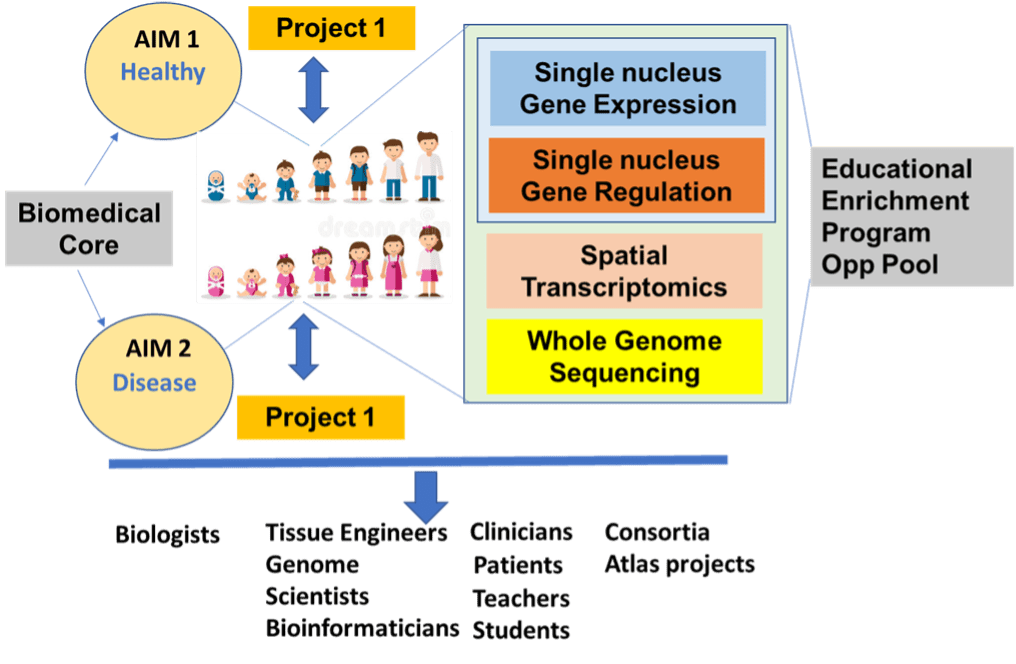Project 1
Project 1 of pKidCAP will construct a multimodal atlas of spatially resolved single nucleus gene expression and chromatin state maps with accompanying genomic variants at key stages of pediatric kidney development by using unique and innovatively collected high quality pediatric kidney samples from the Biomedical Core (pKidBIO).

Aim 1: To define the cellular diversity, gene expression and epigenetic landscape (from the same cell), associated molecular trajectories mapped to histological space using spatial transcriptomics and DNA variants in human reference kidneys across the pediatric lifespan at timepoints relevant to kidney function and disease.
Aim 2: To define the gene expression and epigenetic landscape (from same cell) in kidney biopsies from children with glomerular disease with a focus on focal segmental glomerulosclerosis (FSGS) and identify genes and pathways associated with shifts from healthy to altered cell states.
Principal Investigator

Sanjay Jain, MD, PhD
Professor of Medicine, Nephrology
Professor of Pediatrics, Molecular Genetics and Genomics Program
Director Kidney Translational Research Center
Washington University in St. Louis School of Medicine
Sanjay Jain is a Professor of Medicine, Pediatrics and Pathology & Immunology at the Washington University School of Medicine in St. Louis, Missouri, USA (WUSM). His laboratory focuses on how kidneys and the lower urinary tract develop and organize to maintain homeostasis across lifespan in health and disease. His has defined key developmental pathways and mechanisms that regulate the joining of primitive ureter and bladder, initiation of the collecting system and branching morphogenesis of the kidney and genetic mutations associated with CAKUT. He leads multiple NIH-sponsored atlas efforts to map healthy and disease states in the human kidney including HuBMAP, KPMP, RBK/GUDMAP and Pediatric Center of Excellence in Nephrology. The team has identified, validated and mapped ~100 cell identities in the kidney including healthy and injured cells and defined genes and pathways that help recovery or predict decline in kidney function.
Co-Investigator

Michael Eadon, MD, PhD
Associate Professor of Medicine
Indiana University School of Medicine, Indianapolis, Indiana
Michael Eadon, MD, PhD is a translational physician scientist with accomplishments in the realms of pharmacogenomic discovery, construction of a molecular atlas of the kidney in health and disease, and implementation of pharmacogenomics and genomics of chronic kidney disease. He received his MD from Rush University (2006), completed internal medicine residency at Baylor College of Medicine (2009), and completed a combined research fellowship in nephrology, glomerulonephritis and clinical pharmacology at University of Chicago (2013). He joined Indiana University in 2013 and has appointments in nephrology, clinical pharmacology and medical & molecular genetics.
Eadon’s primary research efforts focus on the translation of pharmacogenomics into clinical practice as well as the identification of novel predictors of renal injury from large genomic and transcriptomic datasets. Major focus areas include the evaluation of renal disease expression patterns with spatial transcriptomics and understanding genetic variants that affect this expression (expression quantitative trait loci). He is an active member of NIDDK’s Kidney Precision Medicine Project and the Human BioMolecular Atlas Project, integrating diverse orthogonal datasets to characterize molecular patterns of kidney disease in subjects who have underwent a kidney biopsy.